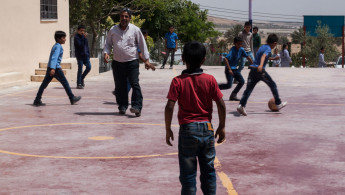$18 a day: Palestinian child labour in Israeli settlements
Mohammed, a 14-year-old Palestinian living in the Jordan Valley, works in an Israeli agricultural settlement to support his family. Long hours, risky and physically demanding work, and low pay: He is one of the hundreds of children illegally employed by Israeli settlers.
For $18.10 a day.
"He is always tired, and has back pain. He sleeps like a stone. When he doesn't have to work he plays with his friends like a normal child," says Mohammed's mother.
The family lives in Zbeidat, a small village located in the Jordan Valley - West Bank. Sitting with Mohammed on a thin mattress in a room with no glass in the windows, his mother explains that her three sons, aged 14, 19 and 21, have all dropped out of school to support their family.
They now work in a nearby agricultural settlement for $18 a day, like their parents before them.
Mohammed's work involves lifting boxes of dates weighing up to 25kg. Recently he injured his back and was forced to stay home for three days. "I couldn't even carry a bottle of water," he says.
Mohammed admits that he doesn't like school. Yet, he says: "I don't like working in the settlement, but I have to do that. I prefer working outside with the sheep, with my father, it's much better." His dream job is to fix bicycles.
His brothers have also been injured at work. One was hurt by a spike while working in a palm tree, resulting in a surgery costing $130 to the family. The eldest was hit by a box in the nose and has had breathing problems since he was 17 from working in a dusty environment. He will soon have surgery. Another $467 for the family to pay.
| He is always tired, and has back pain. He sleeps like a stone. Mohammed's mother. |
This family is no isolated case in the Jordan Valley. Last month, a Human Rights Watch report denounced the employment of 500 to 1,000 Palestinian children in Israeli agricultural settlements. They interviewed 38, with the youngest being 11 years old.
Their working conditions are as bad as those endured by Mohammed. Temperatures can reach 45C in the summer in the Jordan Valley, and many suffer heat stroke and dehydration. Others have skin and breathing problems after working in fields freshly sprayed with pesticides or after spraying it themselves without protection.
No alternative
According to HRW, about 94 percent of the Jordan Valley is off limits for the Palestinians to use and about 86 percent of all agricultural land is now under the jurisdiction of the settlements' regional councils.
The Palestinians' access to irrigation water is also strongly limited by the Israeli authorities.
In this context, the Palestinians see their possibilities for economic development curtailed. The poverty rate in the Jordan Valley is one of the highest in the West Bank: 33.5 percent for an average of 28.2 percent in the rest of the territory, says the group.
Access to education is also difficult. The villages of the Jordan Valley are under full Israeli control and any construction work should be agreed upon by the Israeli civil administration in the West Bank.
As a result, the Israeli authorities have approved demolition orders against and orders to stop the construction of 39 schools as of 2013, concerning 4,500 students, according to HRW.
| There are more than 15 communities in the Jordan Valley without schools. Sireen Sawafta, a student. |
"There are more than 15 communities in the Jordan Valley without schools. They are not allowed to have one. Many parents cannot afford transport: they have to use private taxis," says Sireen Sawafta, a student with the Ashtar theatre and actress with an upcoming play on children's work in the settlements.
Bill Van Esveld, a researcher for HRW, said: "We are not calling for Israel to apply its labour laws in Palestine because it's not Israel. And the settlements would not be 'okay' if only Israel would stop abusing the Palestinians' rights. Under its international law obligation, Israel should dismantle its settlements.
"In the meantime, the very least it should prohibit and punish settlers for the abuse of Palestinian children. We think that other countries and businesses should not contribute to or benefit from Israel's abuse of the Geneva conventions or its abuse of children's rights."
Locals have taken the matter into their own hands. Yousef Zubeidat, the director of a school in Fasayel, a Jordan Valley village close to Zbeidat, now has 157 children enrolled, against 75 when he opened it 2008.
"I asked all the organisations to help us here, to change their minds, culture, to let the children stay at school. We advise them to learn technical works not to go to the settlements," says Zubeidat.
The number of children leaving his school has fallen over the last few years, from about 40 a year to 16 since September. "We hope that the number goes down to zero."
Mohammed's mother wants a more direct solution.
"There is no other option," she says. "Settlements are the only place we find work. The Palestinian Authority is not offering us any other work. The solution is to make Palestinian factories and farms where we, Palestinians, can serve our people, our families, our national economy."
Some of the names in this article have been changed.



